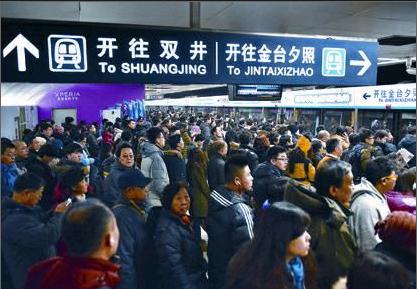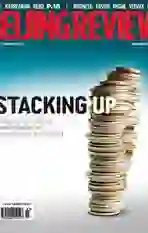Should Subway Fares Be Increased?
2014-02-12

The Beijing Municipal Governments latest indication of a possible subway fare increase has triggered heated public debate. According to a working draft released by the municipal government on December 13, 2013, local authorities are mulling over proposals to raise subway fares in an apparent bid to cut the overall cost of transport subsidies in the city. Plans are said to involve a differential pricing system during peak hours to ease the volume of passenger, the government said in the draft.
Beijing has the cheapest public transportation system in the country. In 2007, the city reduced its subway fare from 3 yuan ($0.49) to 2 yuan ($0.33) regardless of distance traveled and slashed bus fares to 0.4 yuan ($0.07), in an effort to encourage people to use public transportation and ease congestion on the roads.
While some experts agree raising subway fares will ease the burden on the citys coffers, many local commuters believe that it will have little effect in helping ease the rush-hour commuter flow. The following are excerpts of public opinion:
Supporters
Yu Ling (Time Weekly): People who oppose raising fares often emphasize the public-service nature of the subway. They believe they should have the right to enjoy the benefits of a lowprice subway service.
As a form of transportation, the subway should also be operated in accordance with market law. We may call it a kind of “quasi- public service.” A “quasi-public service” can be funded by either the government or private entities.
In recent years, a trend has seen many governments worldwide begin to change their thoughts on subway operation and make efforts to attract investment from the market to relieve the pressure of inadequate funding and improve efficiency.
In the same way, the Beijing Municipal Government also wants to bring in market mechanisms to relieve the financial pressures of its own subway operations. If the price is made artificially low, market laws will be broken and private investment cannot be attracted. The action that brought down the subway fare in 2007 was just an expedient measure to relieve the pressure of traffic for the 2008 Olympic Games. This time, the municipal governments decision to raise the subway fare is to adjust the ticket price from an abnormal state to a normal one.
Zhong Yi (Jiefang Daily): I have to admit that a low subway fare is a good thing for people in the short term. However, from a long-term perspective, the reduced fare will bring about bad results.endprint
A ticket price that is set too low will result in inefficient transportation, with people who do not have to, taxing the system and posing possible security problems.
Second, rising subsidies for low-cost subway services have placed a greater financial burden on the municipal government. According to the Beijing Finance Bureau, the city earmarked 15.69 billion yuan ($2.56 billion) for buses and subways in 2011. The figure rose to 17.5 billion yuan ($2.85 billion) in 2012. With the expansion of the subway system along with an increase in passenger volume and rising fuel costs, the cost of subsidizing public transportation will continue to rise. It is expected to hit 18 billion yuan ($2.94 billion) in 2013. With more subsidies, at the expense of taxpayers, going to public transportation, there will be less public spending in medical, educational, housing and social security sectors.
Third, a low price means a low-quality service. Without benefits from the operation, subway companies have no incentives to provide sufficient services. I have heard passengers complaining there are no elevators at many subway stations in Beijing.
Lu Wenjiang (Beijing Times): Bearing in mind high operation costs, it is necessary to find a balance where ticket prices are acceptable to both operating companies and commuters.
With low ticket prices, more commuters means heavier financial pressure. With more commuters flooding subways during rush hours, operators are faced with increased security pressure. A flexible ticket price is an option to ease financial and security pressures for operators.
We must also understand that adjusting fares is just one choice. If we want to thoroughly solve the citys traffic problem, a comprehensive improvement of public transportation is necessary. I hope the city can grasp the chance to further develop its public transportation and make it more convenient.
Opponents
Dong Bihui (Qianjiang Evening News): It seems that the Beijing Municipal Government wants to use pricing lever to reduce the density of subway commuters from 10 persons per square meter to five persons per square meter. Is this possible?
In theory, a ticket price increase can reduce the number of commuters. But in reality, rigid demand will reduce the effect of this strategy. For example, office workers, who form the majority of commuters during the morning and evening rush hours, will keep taking the subway, because they are left with no better choices as the roads are congested while taxi fares are expensive.endprint
Furthermore, one of the aims of fare reduction in 2007 was to attract more people to take the subway and ease traffic congestion on the roads. If the rise of subway fares drives some passengers to take buses instead, that will again increase traffic congestion.
Yang Xiaojun (www.jcrb.com): I firmly oppose the Beijing Municipal Governments proposals to raise subway fares.
According to the municipal government, one reason for the fare hike is that too many people take the subway, putting pressure on the subway system. Beijing is a crowded city, but nobody has the right to stop the citys residents taking the subway. Beijings public transportation has a certain capacity. If fewer people take the subway, there will be more who choose to take buses or to drive. This will put more pressure on the roads and add further pollution to an already smog-filled city.
Second, according to the municipal government, another reason for the hike is that there is heavy financial pressure on the government caused by the 18 billion yuan($2.94 billion) subsidy each year. But making the commuters take responsibility is wrong. I always believe that the subway provides a social welfare service to the public, and therefore the government should maintain the current subsidy policy.
Third, there is a transparency problem. The government said it has spent too much money on the subway, but there is no precise information about how the money was spent. The government should disclose more information on the cost and revenue of public transportation and invite a third party to audit their books.
Tang Jiachen (www.haiwainet.cn): The end of the “2-yuan ($0.33) era” will lead to two outcomes: First, the costs in time or money for most people using public transportation will increase. The subway fare should take into account both the fiscal capacity as well as the financial burden on commuters. Second, congestion on roads will increase.
Obviously, the government wants to release part of its financial burden by raising the subway fare. However, the costs for the government may be bigger after the price hike. On one hand, the move may cause public resentment. According to a poll taken by Sina.com, 61.3 percent of the 15,200 respondents were opposed to the price increase, with 34.8 percent agreeing with it. On the other hand, more pressure on road traffic may need more government subsidies.
My conclusion is that more assessment is needed to decide the subway fares, and more measures—such as infrastructure building, scientific design of traffic systems and urban development planning—are needed to solve the citys traffic congestion.endprint
